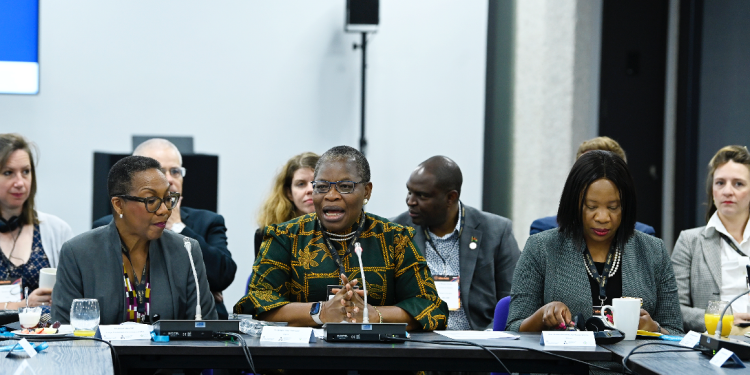AFRICAN MINISTERS AND DEVELOPMENT PARTNERS CALL FOR ACTION ON EDUCATION CRISIS
African Ministers of Education, with support from the Global Coalition on Foundational Learning, have showcased a growing commitment from African policymakers and Heads of State to address the learning crisis. This initiative follows the recent announcement by His Excellency Mr. Hakainde Hichelema, President of Zambia, accepting an invitation to become the Champion of Foundational Learning (FL) in Africa.
In a joint statement signed by Douglas Syakalima, Zambian Education Minister, representing President Hakainde Hichelema, and Dr. Obiageli ‘Oby’ Ezekwesili, former Nigerian Minister of Education and President of Human Capital Africa, they affirmed the importance of foundational literacy and numeracy skills for students’ academic success and future workforce integration, which is crucial for the continent’s prosperity.
Zambian Education Minister Hon. Douglas Syakalima stated:
- “If 9 out of 10 of our children are unable to understand a simple sentence or do basic math, the workforce of tomorrow will not support our sustainable growth.”
- “Given the scale of the learning crisis, African policymakers and practitioners are actively seeking evidence-based solutions for rapid impact on FL, while recognizing the roles of Social and Emotional Learning (SEL) and Early Childhood Education (ECE).”
- “Addressing foundational learning is essential for economic growth and future generations. Solid foundations are crucial for all progress.”
To achieve these goals, educators emphasized the need for African leaders to urgently address the continent’s challenges:
- “African-led solutions to African challenges are necessary, with an honest look at the data to accurately assess the problem.”
- “A shift is needed from fragmented, cherry-picking approaches by development partners to integrated FLN programs.”
- “Development partners should collaborate as a single entity and rigorously support scaling effective FLN initiatives.”
Malawi’s Minister of Education, Madalitso Wirima Kambauwa, recommended developing and implementing integrated FLN programs. Emphasis was placed on:
- Evidence-based approaches in program design.
- Incorporating implementation research findings to optimize success.
- Collaboration at national, regional, and continental levels involving all stakeholders.
Mrs. Ibukun Odusote, Chairperson of the Board of Trustees of NiRA, expressed gratitude for stakeholders’ dedication, emphasizing the importance of community and shared vision:
- “Your dedication and contributions have been instrumental in our continued success and growth.”
- “Collaboration and passion are essential to overcoming obstacles and achieving our goals.”
NiRA highlighted the success of existing programs and the need for scaling them to drive outcomes. Success stories from Ghana, Malawi, and Zambia demonstrated effective strategies like data-driven approaches, community engagement programs, and the ‘Teaching at the Right Level’ (TaRL) model.
Challenges such as teacher capacity and retention in rural areas were acknowledged, with recommendations for tools and cost-effective solutions like Structured Pedagogy and TaRL. Accurate data collection and analysis were emphasized for measuring learning outcomes.
Looking ahead, the African Union Year of Education (AUYoE) in 2024 presents a significant opportunity to campaign for ending the learning crisis and advancing foundational learning through a continental scorecard to track commitments.
Upcoming opportunities for contribution include the African Union Mid-Year Summit in Accra, Ghana, in July, and the FLEX ADEA High-Level Policy Dialogue in Kigali, Rwanda, in November.
The joint statement concluded with a call to action:
- “We are committed to ensuring foundational learning is central to Africa’s future education strategy.”
- “We urge stakeholders to implement recommendations from the ADEA High-Level Policy Dialogue in Lusaka and the Call to Action from the African Union Summit in Addis Ababa.”
“Together, we can ensure all African children have access to quality education and the opportunity to reach their full potential.”

